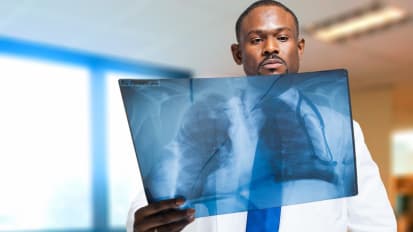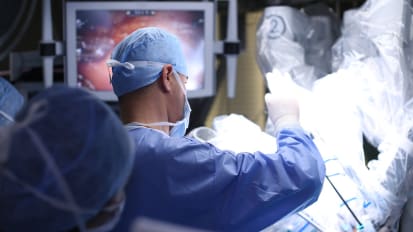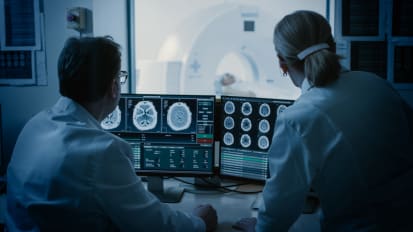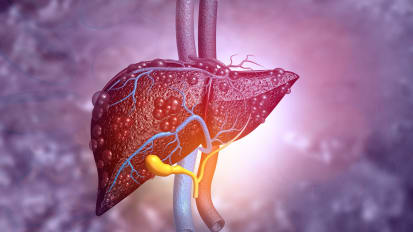Search
 Video
Video
High Risk for Breast Cancer: Methods and Schedules to Ensure Optimal Screening
Hematologist-oncologist Elham Vosoughi, MD, starts with an update on breast cancer stats, noting that incidence in the United States is increasing by 1% every year – with an even sharper rise for women under 50. Video
Video
Making Sense of MGUS: How to Detect Plasma Cell Disorders and Assess Associated Risks
Affecting up to 5% of the U.S. population (and increasingly common with age), monoclonal gammopathy of undetermined significance (MGUS) raises the risk of multiple myeloma, but – as its full name suggests – it can be hard to say by how much. Video
Video
Advances (and Uncertainties) in Oncology: Current and Future Roles of Antibody Drug Conjugates
Focusing on common bladder, lung and breast cancers, three UCSF oncologists describe how antibody drug conjugates (ADCs) are changing the treatment landscape, especially for refractory cases Video
Video
New Keys to Cancer Care: How 2023 Findings Impact Treatment Decisions
These four collaborative talks from UCSF and John Muir Health specialists shine a light on recent study results that should inform treatment planning for patients with a variety of GI, breast, lung and blood cancers. Video
Video
Advances in Breast Cancer Care: Individualized Screening, Treatments and Follow-Up
Karen Goodwin, DO, covers everything from how to answer patients’ questions on mammogram frequency to how to counsel them on breast cancer prevention. Video
Video
Navigating the Maze of Breast Cancer Guidelines: Efficient Paths to Personalized Screening
To help PCPs address patients’ breast cancer screening concerns, surgeon Shoko Emily Abe, MD, FACS, breaks down the multitude of screening directives and modalities, with a focus on the needs of those at average risk and those with dense breast tissue. Video
Video
Lung Cancer Screening: Who, How and When to Refer
†horacic radiologist Brett M. Elicker, MD, and thoracic surgeon Johannes Kratz, MD, present about current lung cancer screening guidelines: who, how, and when to refer. Video
Video
UCSF Osher Center Overview: Integrative Medicine’s Value for Providers and Patients
Sanford C. Newmark, MD, medical director of the UCSF Osher Center for Integrative Medicine, explains what integrative medicine is (hint: it’s neither “alternative medicine” nor homeopathy) and how referred patients can benefit from its proven techniques. Video
Video
Screening for Cervical Cancer: New Evidence on Options and Outcomes
Gynecologic oncologist Megan Swanson, MD, MPH, deciphers recent changes to cervical cancer screening guidelines and uses the data to illuminate the relative value of test options – Pap smears, detection of high-risk HPV strains, or both tests together. Video
Video
Get Current on COVID: The Evidence on Vaccine Efficacy and Strategies for Immunocompromised Patients
A panel of experts answers all the current questions on breakthrough infections, who needs boosters, whether to keep recommending masks, and the future of variants, with a spotlight on meeting the needs of the immunocompromised, such as organ transplant recipients and cancer patients. Bonus: what to know about molnupiravir to treat COVID-19. Video
Video
Proven, Practical Prevention: Lower Your Patients’ Cancer Risks – and Anxiety
In this second part of her series on lifestyle and cancer, medical oncologist Natalie Marshall, MD, offers evidence-based answers to common questions on diet, sleep, and other risk-related factors. Video
Video
How Technology, Human Values and New Scrutiny of Old Methods Are Improving Cancer Outcomes
Three surgical oncologists offer exciting news on hepatobiliary, thyroid and breast cancers. First up is a look at benefits of minimally invasive robotic surgery for rectal cancers; regional therapy for metastatic GI cancer; 3D virtual surgical planning; and biomarkers for pancreatic cysts. Video
Video
Screening Guidelines for Common Cancers: A Lifesaving Update
In just 35 minutes, hematologist-oncologist Akshiv Malhotra, MD, presents the current recommendations on cervical, breast, colon and lung cancers, breaking down the test options for each and when to start tests based on a patient’s risk. Video
Video
CBC: Optimizing Use of an Everyday Blood Test
Hematologist Neil Dunavin, MD, a specialist in blood cancers and BMT, elucidates the commonly ordered yet imperfectly understood complete blood count, with guidance on which differential type to order and which results call for investigation. Video
Video
Cancer Preventive Care: Empower Your Patients to Take Small-But-Significant Steps
Patients worry about cancer but struggle to make lifestyle changes. Here’s how to discuss factors they can control and realistic steps they can take. Video
Video
A Better Understanding of Breast Cancer Risk: How to Find the Best Options for Individual Patients
Doctors must weigh numerous factors as they seek to identify and manage patients at high breast cancer risk. Video
Video
Breast Changes: Managing Lumps, Pain, Discharge and Other Common Concerns
Breast anatomy is complex, and everything from aging to implants can make exams tricky. Breast surgeon Shoko Emily Abe, MD, FACS, offers help with working up common issues that are often benign yet may require treatment or follow-up. Video
Video
A Concise Guide to Colorectal Cancer for Primary Care Providers
This presentation on colorectal cancer – the third most common cancer in the U.S. – unpacks the risk factors (including how to assess family history); reviews symptoms, treatments and survival data; and offers guidance on meeting patients’ post-treatment needs. Video
Video
Hope on the Horizon: Specialists Reveal New Approaches to Deadly Malignancies
Here’s an exciting look at recent improvements in our understanding and management of certain malignancies normally associated with a poor prognosis. Video
Video
Anal Cancer: A Primary Care Guide to Risks and Screening
Infectious disease specialist Cristina Brickman, MD, MSCE, explains how common anal cancer really is, which HPV types are associated, which patient populations should be screened and when to start – and when to refer to a specialist. Videos demonstrate proper technique for anal cytology collection and digital anorectal exams. Symposium
Symposium
Cancer Center Grand Rounds Series
 Video
Video
Cancer Update: Safe Opioid Use and Innovations in Blood Cancer Therapies
In this three-part presentation, UCSF substance use experts offer prescribing strategies and tips on patient communication to ensure pain relief without enabling drug dependence. Video
Video
Update on Liver Lesions: What Works in Managing HCC
Based on clear metrics, transplant hepatologist Neil Mehta, MD, presents diagnostic criteria for hepatocellular carcinoma, then shows how UCSF’s HCC team reaches decisions on treatment for individual cases – with plans ranging from resection or ablation to downstaging drugs and transplantation. Video
Video
Strategies for Head and Neck Cancer: What to Look, Feel and Listen For
UCSF specialist Chase Heaton, MD, presents a guide to identifying head and neck cancers, including steps, tools and tips for a comprehensive exam; alarm-bell statements from your patients; and the one assumption you want to make about any neck lump.


